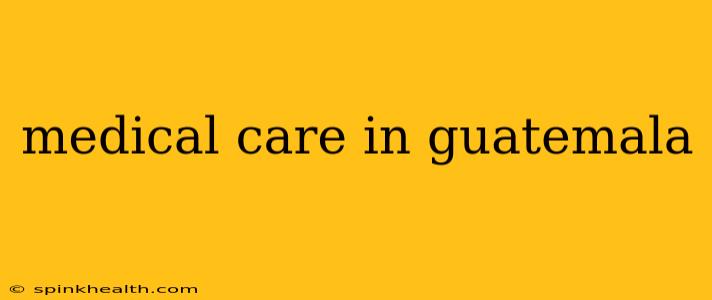Guatemala, a land of vibrant culture and breathtaking landscapes, also presents unique challenges when it comes to healthcare. Planning a trip? Understanding the Guatemalan medical system is crucial for a safe and enjoyable experience. This guide will walk you through the realities of medical care in Guatemala, addressing common concerns and offering practical advice.
Our journey begins with a look at the stark contrast between the healthcare experiences available to different segments of Guatemalan society. The reality is multifaceted, ranging from sophisticated private clinics in Guatemala City to vastly under-resourced public facilities in rural areas.
What is the quality of healthcare in Guatemala?
The quality of healthcare in Guatemala varies dramatically depending on location and access to resources. Private hospitals in urban areas, particularly in Guatemala City, often meet international standards, employing qualified doctors and offering advanced medical technology. However, even in these facilities, some aspects of care may differ from what you're used to in other countries. Language barriers can pose a significant challenge, as can cultural differences in medical practices.
Conversely, public healthcare in rural Guatemala struggles with limited resources, insufficient staffing, and inadequate infrastructure. While dedicated medical professionals work tirelessly under challenging conditions, access to quality care remains a significant issue in these areas. Infectious diseases are more prevalent in these regions, highlighting the disparity in healthcare access across the country.
What type of medical insurance is recommended for travel to Guatemala?
Comprehensive travel insurance is absolutely essential before venturing to Guatemala. A standard policy may not suffice. Look for a plan that covers emergency medical evacuation, which can be incredibly expensive in the event of a serious illness or injury. Ensure your policy explicitly covers medical care in Guatemala and includes repatriation to your home country if necessary. Check for any limitations regarding pre-existing conditions. Having the peace of mind knowing you're covered for unforeseen medical emergencies is invaluable.
What are the common health risks in Guatemala?
Guatemala's climate and environment pose specific health risks. Mosquito-borne illnesses like dengue fever, Zika virus, and chikungunya are prevalent, particularly during the rainy season. Food and waterborne diseases, including typhoid and cholera, also present a concern. Proper hygiene practices, such as drinking bottled water, avoiding raw or undercooked food, and using insect repellent, are crucial preventative measures. Staying up-to-date on recommended vaccinations before your trip is another important preventative step.
What is the cost of medical care in Guatemala?
The cost of medical care varies dramatically. Private hospitals and clinics charge considerably more than public facilities. Expect to pay significantly higher prices for specialist consultations, diagnostic tests, and treatments in private settings. Emergency care in private facilities can be extremely expensive, reinforcing the importance of robust travel insurance. Public hospitals offer more affordable care but may not always have the resources or equipment you'd expect. Be prepared for a range of costs and factor this into your travel budget.
Are there any English-speaking doctors in Guatemala?
While Spanish is the official language, you can find English-speaking doctors, especially in larger cities and private clinics catering to international clientele. However, it's advisable to be prepared for some communication challenges. Consider carrying a phrasebook or using a translation app to facilitate communication with medical professionals. Hospitals in tourist areas may also have staff with some English proficiency. Prior research, contacting your travel insurance provider, or your embassy for recommendations are crucial steps to ensure communication clarity in an emergency.
How do I find a good doctor or hospital in Guatemala?
Finding reputable medical care in Guatemala requires research. Your travel insurance provider may offer a list of recommended doctors or hospitals. Online reviews and recommendations from other travelers can also be helpful, though always exercise critical judgment. If you’re in Guatemala City, you’ll find more options for high-quality private care. If you're venturing into rural areas, access to quality medical facilities becomes considerably more limited.
What should I do in a medical emergency in Guatemala?
In a medical emergency, contact your travel insurance provider immediately. They can assist with finding appropriate medical care and coordinating any necessary evacuations or repatriation. If possible, seek assistance from your embassy or consulate. They can provide valuable support and resources. Knowing the emergency numbers (911) is also essential in case you need to call for immediate assistance. Being prepared for unexpected circumstances can truly make the difference.
Remember, responsible travel planning includes anticipating potential health challenges. By understanding the nuances of medical care in Guatemala and taking appropriate precautions, you can enjoy your trip while prioritizing your safety and well-being.

